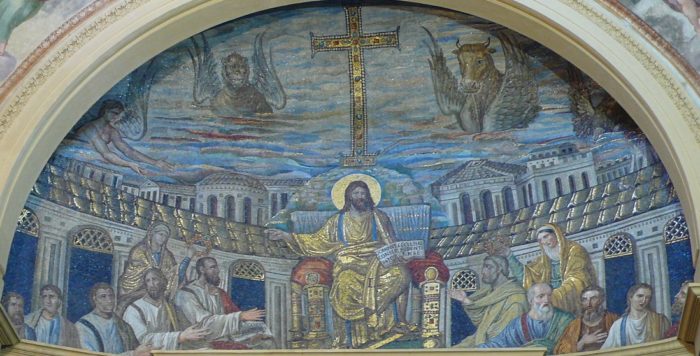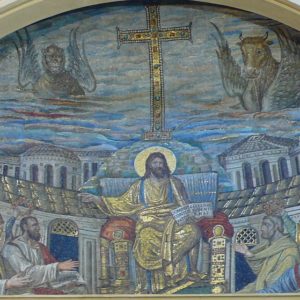
What does Christ want the structure of the Church to look like? And what did the early Church look like? I’ve just written a thorough exploration of that question, but I know that the length (5000 words) is going to be too much for some readers, and that the sheer volume might it hard to remember the salient take-away points. So I’ve created this shorter version to help. To start, there are basically two schools of thought:
- Catholics, Orthodox, Anglicans: Local churches were run by a single bishop, in union with presbyters (elders, later called priests) and deacons. The technical name for this is monoepiscopacy. (which just means “one bishop”).
- Non-Anglican Protestants: local churches were run by a group of elders and deacons. There is no distinct office of “bishop,” since “bishop” is just another name for “elder.” We’ll call this system presbyterian(with a small-p, because it’s not just Presbyterians who believe this).
One of the clearest short defenses of the presbyterian position is from Michael Kruger, a professor of New Testament and Early Christianity at Reformed Theological Seminary (he’s also the seminary’s president). His argument consists of three parts: some New Testament interpretation, a claim that three first- and second-century documents (the Didache, 1 Clement, and the Shepherd of Hermas) show this presbyterian structure, and a quotation from St. Jerome that seems to agree with his view. So what’s wrong with Kruger’s argument, and the presbyterian position more broadly?
- The New Testament argument ought to be borne out in early Church history. If presbyterians are right that the New Testament is describing a “presbyterian” church structure, we should see pretty clear first- and second-century evidence of a presbyterian church structure, or else see evidence of a switch to a monoepiscopal structure. We see neither of these things.
- None of the three documents that Kruger claims speak of “bishops” ruling local churches actually say that. It’s a hallmark of a bad theory that the advocates avoid all of the directly relevant texts. It should set off red flags when you see Baptists trying to defend their position on baptism being merely symbolic, and none of the verses they cite even mention baptism. And it should set off alarms here that Kruger’s defending his position on the structure of the local church without citing any texts mentioning local churches.
- Kruger and other presbyterians conveniently omit St. Ignatius. St. Ignatius of Antioch, one of the two known disciples of the Apostle John (the other being St. Polycarp) writes a series of seven letters. Unlike the sources Kruger cites, five of Ignatius’ letters are to the local churches and about the local churches. From his writings, we know that each of these churches (including the churches of Ephesus and Philadelphia, praised in Scripture) are run by single bishops. In most of the cases, we even know who the bishop was, because Ignatius addresses him by name.
- Ignatius isn’t arguing for the monoepiscopacy, he’s acknowledging it. Ignatius is sometimes mischaracterized by presbyterians as “arguing for” the monoepiscopacy, as if the early churches didn’t have that structure but he thought that they should. But that’s plainly untrue. He’s writing to them to obey the bishops that they already have, not to change their structure of governance. There’s a world of difference between saying “obey the bishop” and “you should have a bishop,” just as there’s a world of difference between “honor thy father and mother” and “you should have a father and mother.”
- Second-century evidence disproves Kruger’s read of Clement and Hermas. The Muratorian fragment in 180 A.D. mentions in passing that Hermas wrote “very recently, in our times,” while his brother Pius was the Bishop of Rome. So not only was there a monoepiscopacy at the time of Hermas, but the bishop was his brother Pope Pius I. About that same time, St. Irenaeus publishes one of the many lists that recount every pope from St. Peter down to this own time, and in that list he notes that St. Clement was the Bishop of Rome when he wrote 1 Clement.
- Jerome is over-arguing. Jerome was responding to those who would make deacons equal to presbyters. In arguing against them, he goes too far, claiming that presbyters were originally equal to bishops. But Jerome’s own writings on Church history actually disprove his claim. Besides this, he’s writing in the fourth century, and we’ve seen from the second-century sources that this wasn’t the case.
- All the evidence points to the monoepiscopacy. Everywhere where we know the structure of a particular local church, we find a monoepiscopacy. Kruger elsewhere actually compiles a list of orthodox bishops from the second-century, and not one of them is a co-ruler of his diocese. What’s more, when we read the histories of particular churches (whether from those churches or from others), we find that they claim to have always had this structure. Either virtually everyone is lying, or the presbyterian Church structure just wasn’t what was set up by the Apostles.
So there you have it. These are the basic facts you should know about the structure of the early Church. If you want to know more, feel free to read the full post.

The “reformation” is built upon a historical lie that the “true early church” was somehow non-Catholic in nature and then got lost by heretical Catholics. Very similar to Mormonism but Joseph Smith had the guts to create new scripture to get around the historical problem that the “early church” was overwhelmingly Catholic.
If the early church wasn’t overwhelmingly Catholic then I give up and Christianity is just another false religion.
Doesn’t the Book of Revelations testify to the leadership of on single bishop over a city or territory?
Consider these quotes:
“What thou seest, write in a book, and send to the seven churches which are in Asia, to Ephesus, and to Smyrna, and to Pergamus, and to Thyatira, and to Sardis, and to Philadelphia, and to Laodicea…..
…”The seven stars are the angels of the seven churches. And the seven candlesticks are the seven churches.”…
…”Unto the angel of the church of Ephesus write”…
…”And to the angel of the church of Pergamus write”….
…”And to the angel of the church of Thyatira write: These things saith the Son of God, who hath his eyes like to a flame of fire, and his feet like to fine brass. I know thy works, and thy faith, and thy charity….”
…And to the angel of the church of Pergamus write: … I know where thou dwellest, where the seat of Satan is: and thou holdest fast my name, and hast not denied my faith. Even in those days when Antipas was my faithful witness, who was slain among you, where Satan dwelleth.”
It is very clear that the term “angel”, above, signifies through metaphor a singular person which clearly is the leader of each of the said Churches. That is, it signifies that each of the respective cities has a single leader who is responsible for the same Churches in their jurisdiction.
For the doubters out there: Do literal “angels” anywhere else in scripture get reprimanded by God for failure to fulfill a mission whereby they will be punished or rewarded according to the works that they do?
People just need to read the first 3 chapters of the Book of Revelation to easily understand that the ‘angels’ referred to there are the said bishops of the seven Churches being addressed in these same chapters.
Pretty easy to comprehend for those who aren’t brainwashed by Protestantism yet..
Dear Joe. Fantastic.
Thank you
Thank you!
Don’t we see inklings of this in Acts where it says that Paul goes to meet James and the elders in Jerusalem?
So, the bishop of Rome has authority over the Syriac Church, founded before his own bishopric? Or the Armenian Church?
How about Gregory “the Great” rebuking those who called him “universal pontiff” etc. etc.?
“If the early church wasn’t overwhelmingly Catholic then I give up and Christianity is just another false religion.”
The Word of God stands by itself, it has no need of anything made by, thought by or built by mortals. Men may run to it or away from it, but it will endure forever.
There is no mediator between God and man except Jesus Christ the Righteous.
Those who have caused others to stumble by teaching to the contrary will have that blood upon their own heads.
That is what Christ and the Apostles said.
Forgive me for passing by and reading your comment. How does the Word of God stand by itself? If by Word, you mean Jesus the Christ, then Jesus although can stand by himself, planted a Church which is His body.
If by Word you mean the Holy Scriptures then how could it stand by itself without the Church Writing and gathering it together for people?
There is nothing to forgive. Suppose a man who had never heard of Christ washed up on a desert island and found there a Bible in a language he could read. As a result of that reading, this man comes to faith in God and His Son. He knows nothing of churches or of the history of Christianity. Is that man’s faith acceptable to God? Will he be saved if he were to die alone on that island? Is a church or its “sacraments” necessary to his salvation?
I suggest that the power to accept or condemn remains were it always has, with God and His Son.
Frankly, I don’t know how any person who reads the Gospels and should thereby get some sense of the greatness that is Divine Love and Divine Wisdom, can believe that such thing, which are literally beyond human understanding or expression, are to be confined in petty rituals and dogmas ordained by men some of whom were outright aetheists, if not much worse.
That is not to say that words – what some might call rituals – do not have great power at times, because they clearly do, but man does not create those, he finds them through the Holy Spirit who as Christ said, “will lead you into all truth”.
Peter was led by the Spirit, as were all the apostles after Pentecost, but he was still capable of error, as Paul pointed out to him.
So, what is the church that Christ planted? Is the Syriac Church, which was founded before the Church of Rome? Do we really believe that God and His Mercy are going to be confined to some institution?
Surely the The Body of Christ, is the body of believers. Who can weigh the faith and works of each one? Who can say one is saved and another is not?
Let us be sensible: only Father, Son and Holy Spirit can judge, for who else can weigh men’s souls and deeds.
And therefore will Father, Son and Holy Spirit delegate that power to sinners, to mortal men, as much in need of mercy and salvation as any other? Men, who can hardly weigh their own hearts, minds and deeds, much less those of other men!
“…with the Church writing and gathering it together…” Since the Roman Catholic church certainly did not do all or even most of that, I assume you mean “the Church” as in the whole body of believers?
He knows all friend. He alone will judge. He has told us not to.